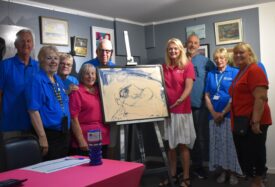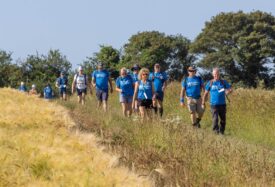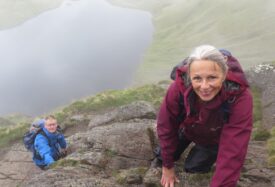Pilgrims’ Death Cafe is full of life

Pilgrims Hospices has hosted Death Cafes at its education centre in Canterbury, around east Kent and virtually over the past few years.
But what exactly is a Death Cafe, and why would anyone want to go to one?
The Death Cafe movement was set up in 2011 by Jon Underwood from his home in East London. Jon believed that a Death Café could be a safe and informal space for people to come together and talk about death over coffee and cake. This idea took off and has since spread around the world; perhaps its popularity is due to how often we avoid talking about death as part of our daily lives.
At our Death Cafes, the Education team serves coffee, tea and cake, and after a short introduction, everyone listens to each other talk – there is no set agenda or format.
Pilgrims Education team have hosted Death Cafes around east Kent, with the most popular location being the Ann Robertson Centre, a Pilgrims-run meeting and training centre situated next-door to Pilgrims Hospice Canterbury.
It was fascinating. I loved the mix of people, all ages and backgrounds and careers.Karen Bartholomew, who attended her first Death Cafe at Pilgrims in 2017
The first Pilgrims Death Cafe was part of Dying Matters Awareness Week in 2017, a campaign to help enable people to talk openly and honestly about death.
Chance for an ‘open discussion’
Pilgrims’ Education team explained: “It’s important for Pilgrims to be centred in the local community, not just providing care and support to patients and their families. We want to engage with all local people to openly encourage discussion on topics like death.
“When the first posters went up and there was a mixed reaction. Some people found the name ‘Death Cafe’ too morbid or too shocking, others thought that it was a brilliant idea; either way, it seemed that this kind of discussion was very much needed in our community.
“We were just asking people to turn up and talk together over coffee and cake. The only thing we were unsure of was whether anyone would actually want to come; now we often find ourselves with a room full of people all animatedly chatting, laughing and expressing themselves. We receive outstandingly positive feedback, everyone is keen to come back. ”
Conversation, coffee and cake
Local playwright Karen Bartholomew, writer of God’s Waiting Room – a beautiful, moving and very funny play about death and loss within a family – shared her experience of attending her first Death Cafe. She said, “It was fascinating. I loved the mix of people, all ages and backgrounds and careers. I was most interested in older people talking so frankly about their concerns of dying alone. Death did not worry them but being alone did. As a woman in her forties and with my family still around me at this point in my life, I have not questioned that so closely and it made me realise how some older people might be feeling.
Death is a part of our lives; I think it’s time we talked about it.
Karen
“I felt enlivened, actually. The premise of a Death Café is a hard sell; I know this from the title of my play. Yet still, Death Cafés are whatever you want them to be. I found I learnt more about people, respect, humanity and community in one short morning than I have in any other environment, other than perhaps a theatre. It’s as much or as little as you want to share or listen to. In a world of social media the way we communicate is changing, so I found this a healthy return to people just talking. Loved it!
“Death is a part of our lives; I think it’s time we talked about it more.”
We host Time to Talk community events throughout the year for the general public, aiming to open up the conversation about death and dying; with film screenings, poetry readings and Death Cafes and much more, there’s something for everyone.
To find out more about future Death Cafe events contact the Education team on 01227 812 616 or email [email protected].


